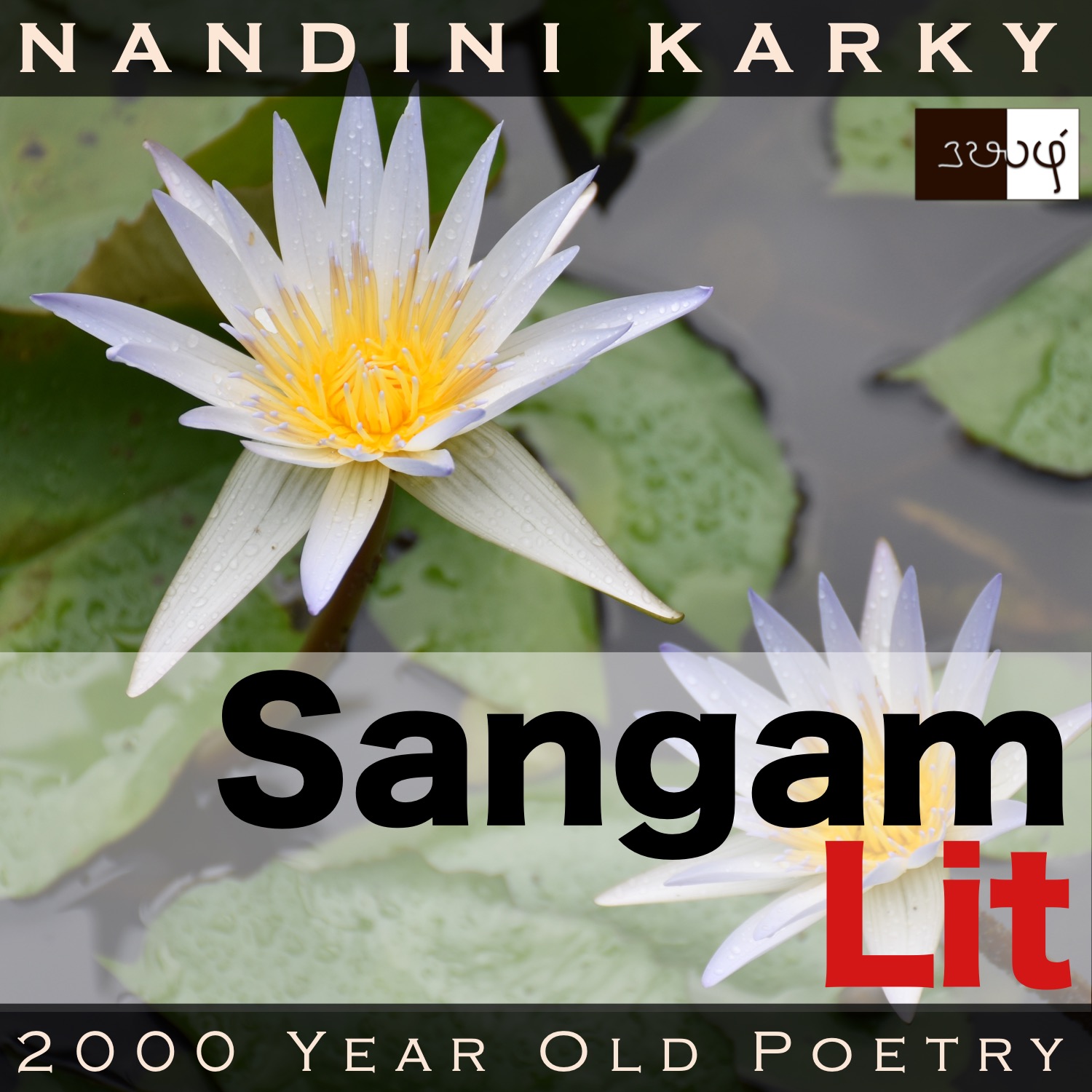Podcast: Play in new window | Download
Subscribe: Apple Podcasts | Spotify | Amazon Music | Android | iHeartRadio | TuneIn | RSS | More

In this episode, we will get acquainted with Natrinai Poem 6, written by Paranar, who in his Sangam poems, talks of rulers of his time and in days before his time. He is therefore considered a ‘historian poet’. In this intimate poem set in the Kurinji landscape of mountainous regions, a man is speaking aloud to his heart, knowing that the lady’s confidante is hanging around nearby.
நீர் வளர் ஆம்பற் தூம்புடைத்திரள் கால்
நார் உரித்தன்ன மதன் இல் மாமை,
குவளை அன்ன ஏந்து எழில் மழைக் கண்,
திதலை அல்குல், பெருந் தோள், குறுமகட்கு
எய்தச் சென்று செப்புநர்ப் பெறினே,
”இவர் யார்?” என்குவள் அல்லள்; முனாஅது,
அத்தக் குமிழின் கொடு மூக்கு விளை கனி
எறி மட மாற்கு வல்சி ஆகும்
வல் வில் ஓரி கானம் நாறி,
இரும் பல் ஒலிவரும் கூந்தல்
பெரும் பேதுறுவள், யாம் வந்தனம் எனவே.
The first sensation that this poem evoked was that of fragrance. For there’s flowers planted along the lines of the verse in ஆம்பல் and குவளை. When I searched to find English equivalents, I found that both words pertained to ‘Water lily’. Why would the ancient Tamils use different words for the same object? Reminded me of the twenty or more words some Eskimo cultures are said to have for snow. This verse makes me wonder whether the water lily, could be something as important to the ancient Tamils, as the Eskimo’s snow or the Italian’s coffee, to the ancient Tamils. Then there’s a troublesome word ‘நாறி’. In modern times, this has come to mean an unpleasant scent but where this word started with, it meant a deep and lovely fragrance. Perhaps, the way our rivers have journeyed from purity to filth, so have some of these ancient words. It’s upto us to bring life and fragrance back to these words and waves.
Coming to the description of the verse, this is said by a super-confident dude. He seems to be talking to his heart but he knows that his lady’s confidante is in earshot. And what does he say? ‘Oh my woman, with a beautiful complexion, similar to when the thick stalk of the ‘Ambal’ flower’s stem is removed; with eyes as cool and moist as the ‘Kuvalai’ flower; with loins stretching in passion and those wide shoulders. How I wish there was someone who could go to her and inform her of my imminent arrival! She is not one to ask, ‘Who is he?’ Imagine the fruits that grow on the curved beaks of the ‘Kumizh’ or the white teak tree. Without a shred of hatred, they fall on their own accord and become food for deer grazing in the forests of that expert bowman Ori. She, who has tresses that are as fragrant as those shaded forests of Ori, will be delighted beyond words, if someone would just go and tell her, I’m on my way.’
I burst out laughing when I read,’’இவர் யார்?” என்குவள் அல்லள், meaning she is not someone to ask ‘Who is he?’ Just imagine the shock if she were to respond to the news with a shrug and say, ‘Please tell whatsisname I don’t remember him!’ Joking apart, here the man is convincing, heaping those words of praise on our lady and trying to recruit the listening confidante to be his messenger. There is also this interesting reference to ‘Ori’. Ori is known to be a king who ruled in the Kolli hills region, part of the Eastern ghats in Tamilnadu. The forests under his reign are described here, as frolicking with deer and with foliage as dense and fragrant as our lady’s tresses. ‘Ori’ is also referred to as ‘வல் வில் ஓரி’, which symbolise him as one with his bow and arrow. A skilled marksmen, for sure! While that speaks of his strength, Ori is also known for his benevolence, being one of the last 7 benevolent kings, or the ‘கடையெழு வள்ளல்கள்’, mentioned in Sangam literature.
I would like to end this episode by dwelling on the reference to மழைக் கண். If I were to translate literally, that would simply be ‘rain eyes’. Many people from the west, I remember from my acquaintance with them, would shudder if one were to equate ‘rain’ with something pleasant. If the skies were to be just a bit cloudy, they would say, ‘Bad weather!’ Whereas, a rain is so welcome here. A cloudy, moist day makes our hearts sing even today. So, I can empathise with this metaphorical expression in describing the lady’s cool, pleasant eyes as ‘மழைக் கண்’! One person’s shower is another’s sunshine!




Share your thoughts...